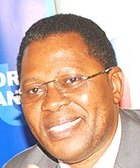Experts mull over Uganda budget with pessimism
June 20, 2018—The government has been queried on its powers of commitment in the wake of the 2018/19 National Budget proposals announced last week.
Speaking recently at the Ernst and Young Budget Breakfast, Private Sector Foundation of Uganda (PSFU) Executive Director Gideon Badagawa said, “It is one thing to have a good plan, but it is quite another to make sure that the plan works.”
Under the theme ‘Industrialization for Job creation and Shared Prosperity’, finance minister, Matia Kasaija gave the highlights for an estimated UGX33 trillion ($8.5 billion) expenditure with infrastructure taking the lion share at UGX4.8 trillion (about $1.2 billion).
Badagawa said, “The budget has been focusing on the same sectors for the past few years giving priority to the same areas. The problem however is that we need to implement for productivity. We need to finance the private sector. We need to commercialize agriculture to ensure the nucleus farmer moves to a productive stage. If this isn’t done, then all we have is a good plan.”
The education sector received the second largest allocation of UGX 2.8 trillion representing 11% of the budget. However, Education Specialist Dr. Goretti Nakabugo said while this is good prioritization, there is a need to have a clear understanding of where this money is going.
“In East Africa, we use very attractive words based on the theme of this year’s budget. However, industrialization cannot be successful without the right human resources. This means money needs to be allocated to areas like up skilling in a bid to deliver budget expectations. A huge chunk of the money allocated to education is the wage bill for teachers.
She said, “The remaining is used to build infrastructure like new schools and classes and renovating old ones. If we are going to achieve growth in this sector, priorities have got to change. We need to invest in the knowledge space to boost innovation and create a work force that is well up skilled.”
Looking at latest tax amendments, Ernst and Young Country Managing Partner Godfrey Mugisha said taxes tend to fall on very few individuals giving Uganda a small collection base. He said there is a lack of understanding on the economy that is being taxed.
“Tax exemptions are seemingly given to individuals that have money instead of the businesses that cannot afford them. I believe we should have a flat rate tax system that levies a fee across the board. This makes it fair and equitable so that when everybody pays a little, no one has to pay too much,” he said.
Fred Muhumuza, a former economist at the finance ministry and now a leading consultant and commentator said,“Sometimes the Minister’s hands are tied. This means all sectors of Uganda’s economy are of top priority. The Ministry therefore ends up allocating funds according to the size of the sector.”
Debt servicing has the third largest allocation budget with UGX 2.6 trillion representing 10% of the entire budget. This according to several speakers at the event means government may just as well be budgeting to pay back what it has already borrowed.
Muhumuza said, “This is the reason Uganda Revenue Authority (URA) has challenges meeting its revenue targets, because it has to raise almost 50% of the budget. The rest is raised from domestic as well as international borrowing which we have to pay back with what URA has collected. If we are to meet revenue targets there needs to be a deliberate push towards proper investment in the business sector. We are spendthrifts with a very narrow tax base which means we need more direct taxes.”


 African Heads of state head to South Korea next week for Summit talks
African Heads of state head to South Korea next week for Summit talks
 Trading leads as main source of income for Ugandans
Trading leads as main source of income for Ugandans
 New leadership for bankers’ umbrella as total assets top $12 billion
New leadership for bankers’ umbrella as total assets top $12 billion
 Brussels Airlines to announce Nairobi service
Brussels Airlines to announce Nairobi service
 SITA promises enhanced travel experience after Materna acquisition
SITA promises enhanced travel experience after Materna acquisition
 Saudia’s 105 aircraft order stretches A320neo lead over rival Max
Saudia’s 105 aircraft order stretches A320neo lead over rival Max
